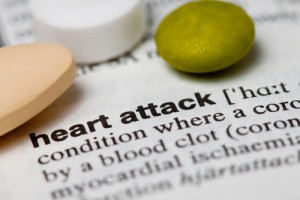
Although there have been huge advances in the treatment of heart disease, it is still the UK’s biggest killer (more information on heart disease can be found at the British Heart Foundation’s website). Depression after a heart attack is common (roughly 20% prevalence) and can worsen heart disease and increase the risk of death. A number of clinical trials, e.g the MIND-IT and the ENRICHD trial have looked at whether treatment of depression following an MI can improve these outcomes.
Short-term follow-up (18 months) of participants in the the MIND-IT trial showed that intervention had no effect on depression and cardiovascular outcomes. One criticism has been that this timeframe is too short to properly examine this relationship, as many adverse outcomes following an MI occur much later on.
A randomised controlled trial (RCT) called ‘Depression treatment after myocardial infarction and long-term risk of subsequent cardiovascular events and mortality’ tried to address this problem. The authors evaluated whether antidepressant treatment of post-MI depression in the MIND-IT trial reduced morbidity and mortality rates till 8 years after treatment started.
Methods
The MIND-IT trial was an RCT based in the Netherlands. Patients who were diagnosed as having post MI-depression (n=331) were randomised to two arms.
An intervention arm, which involved;
- Either a placebo or mirtazipine, or
- If there was no improved with either of these after 8 weeks, citalopram, or
- Treatment at the psychiatrist’s discretion.
Alternatively, patients were randomised to a care as usual arm. They were not told they had a diagnosis of depression, but were free to seek treatment outside of the trial protocol as they wished.
The main outcomes measured were:
- Response to antidepressant treatment (a reduction of ≥ 50% in a HAMDR score), and
- Cardiovascular related hospital re-admission and cardiac related death, or
- All causes of death.
Results

Longer-term follow-up of patients has not offered us any more hope that treating depression can improve cardiovascular outcomes after an MI.
Treatment status was known for 311 patients. 147 of these received treatment (antidepressant or psychological treatment) 143 did not, and 21 received placebo.
70/147 patients in the treatment arm received an antidepressant at some point. 27 of these responded to the antidepressant and 47 did not after 24 weeks.
Cardiovascular related hospital re-admission and cardiac related death occurred in 36.7% of all patients during a mean follow-up of 4 years. This occurred in;
- 34% of patients who received treatment,
- 38.5% who did not, and
- 47.6% who received a placebo.
All cause mortality occurred in 13.95% with a mean follow-up of 5.2 years. This occurred in;
- 9.5% of those who received treatment,
- 18.2% of those who did not, and
- 9.55% who received placebo.
The authors examined survival rates using hazard ratios (the risk of dying over the whole study).
For cardiovascular related deaths;
- HR (placebo vs treatment) 0.94, 95% CI 0.65,1.35; P=0.728
- HR (placebo vs no treatment) 0.84, 95% CI 0.58,1.21; P=0.340
For all cause mortality;
- HR (placebo vs treatment) 0.52, 95% CI 0.28, 0.97; P=0.041
- HR (placebo vs no treatment) 0.56 95% CI 0.29, 1.05; p=0.072
Conclusion
Intervention did not affect the risk of long-term adverse cardiovascular outcomes.
Longer-term follow-up of patients has not offered us any more hope that treating depression can improve cardiovascular outcomes after an MI. However, better survival was found for patients who received depression treatment than those who did not. Depression could be associated with more severe cardiac disease, and the severity of cardiac disease predicts new cardiac events and not depression.
Limitations

This RCT reports that treatment of depression after a heart attack is not beneficial in reducing adverse cardiovascular outcomes
Fewer people responded to treatment than expected. This meant that the study was under powered and may not have been able to detect a statistically significant change in cardiovascular outcome. This trial cannot conclusively say that the antidepressant therapies would have an effect on survival rates.
Other important outcome measures not included in this MIND-IT study (such as quality of life and A&E use) can provide a useful evaluation of treatment in those who suffer from co-morbid physical and mental illness. This Elf is interested to see how the puzzle of treating chronic physical and mental health co-morbidity comes together. Barely a day goes by without hearing in the media how complex long-term illnesses pose an enormous challenge for the NHS (e.g. Guardian article ‘A&E visits hit record high‘).
Links
Zuidersma M, Conradi HJ, van Melle JP, Ormel J, de Jonge P. Depression treatment after myocardial infarction and long-term risk of subsequent cardiovascular events and mortality: a randomized controlled trial (PDF). J Psychosom Res. 2013 Jan;74(1):25-30. doi: 10.1016/j.jpsychores.2012.08.015. Epub 2012 Sep 23.
Thombs BD, et al. Prevalence of depression in survivors of acute myocardial infarction (PDF). J Gen Intern Med 2006;21:30–8.
van den Brink RH, van Melle JP, Honig A, Schene AH, Crijns HJ, Lambert FP, et al. Treatment of depression after myocardial infarction and the effects on cardiac prognosis and quality of life: rationale and outline of the Myocardial Infarction and Depression-Intervention Trial (MIND-IT) (PDF). Am Heart J 2002;144:219-25.
Berkman LF, Blumenthal J, Burg M, Carney RM, Catellier D, Cowan MJ, et al. Effects of treating depression and low perceived social support on clinical events after myocardial infarction: the Enhancing Recovery in Coronary Heart Disease Patients (ENRICHD) Randomized Trial. J Am Med Assoc 2003;289:3106-16. [PubMed abstract]


Treatment of depression after a heart attack does not improve the long-term risk of adverse cardiac events but… http://t.co/fDK9NFhWjY
@Mental_Elf no surprise there. But patient will be more content coping with adversity which is hard to measure! #mhsm #hvhcf cc @HVHForum
20% of heart attack victims experience depression: http://t.co/9DmaIsR4xm
MT @Mental_Elf 20% of MI patients experience depression: http://t.co/miwFdoa2II
An RCT has found that treating post-MI depression did not improve cardiovascular outcomes: http://t.co/9DmaIsR4xm
MT @Mental_Elf: An RCT has found treating post-MI depression didn’t improve cardiovascular outcomes http://t.co/HNOEMy7Y8R #healthpsychology
RT @mental_elf: An RCT has found that treating post-MI depression did not improve cardiovascular outcomes http://t.co/WEXjnzyQJT
However it seems likely that the study did not have a big enough sample to detect a benefit: http://t.co/9DmaIsR4xm
Correction to the above article:
The Hazard Ratio for all-cause mortality for placebo vs no treatment was 0.56 95% (CI 0.29 to 1.05; p=0.072)
I have amended the article accordingly.